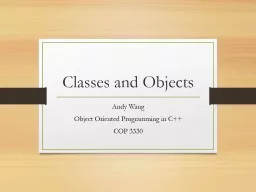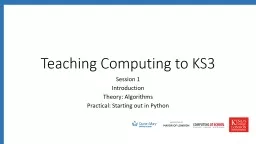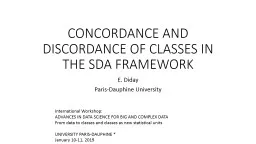PPT-Classes and Objects
Author : briana-ranney | Published Date : 2017-07-26
Andy Wang Object Oriented Programming in C COP 3330 Object Encapsulation of data and functions that act upon that data An object consists of Name variable name
Presentation Embed Code
Download Presentation
Download Presentation The PPT/PDF document "Classes and Objects" is the property of its rightful owner. Permission is granted to download and print the materials on this website for personal, non-commercial use only, and to display it on your personal computer provided you do not modify the materials and that you retain all copyright notices contained in the materials. By downloading content from our website, you accept the terms of this agreement.
Classes and Objects: Transcript
Download Rules Of Document
"Classes and Objects"The content belongs to its owner. You may download and print it for personal use, without modification, and keep all copyright notices. By downloading, you agree to these terms.
Related Documents














